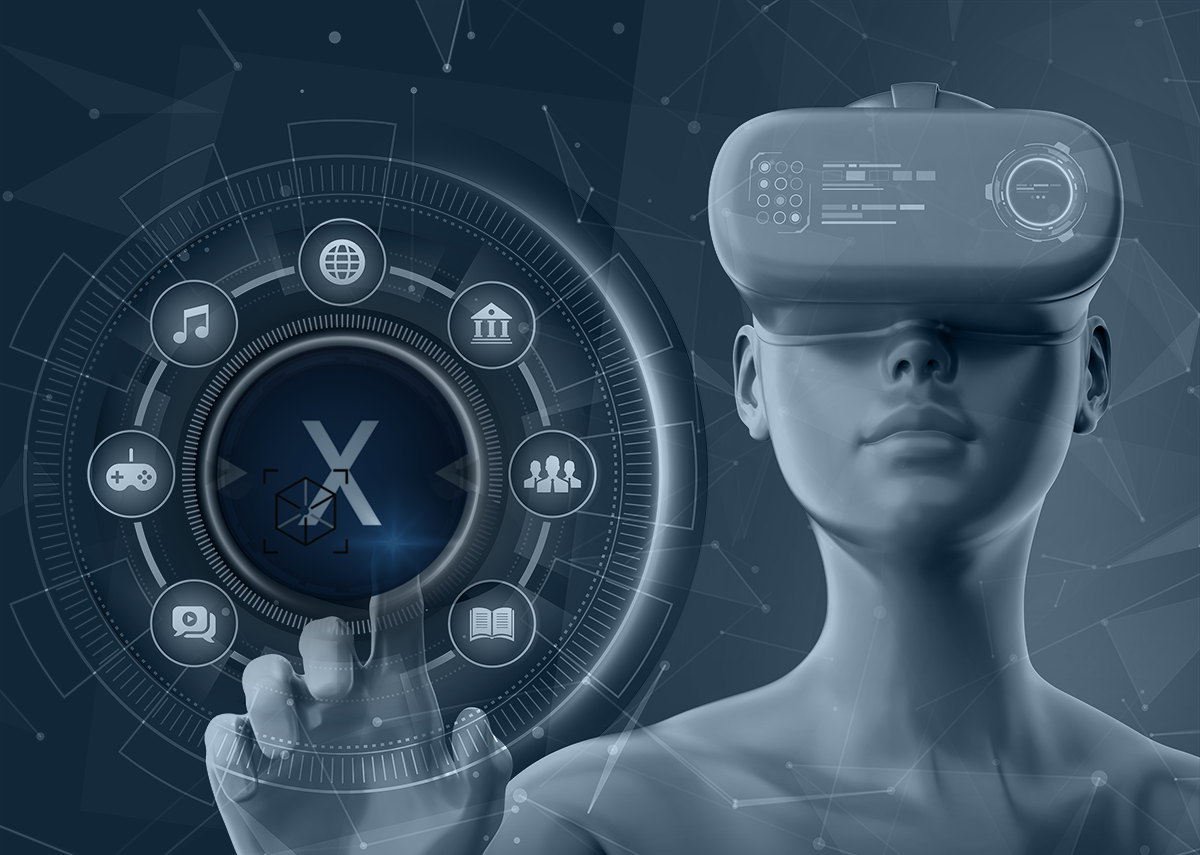
Digital Pioneer: Xpert Reality and the beginnings of Metaverse and Extended Reality – Image: Xpert.Digital
Expert Reality: What do the Metaverse and Extended Reality have in common?
The metaverse and extended reality share some common features and overlaps:
Immersive experiences
Both the metaverse and extended reality offer immersive experiences where users can enter and interact with virtual environments. They allow users to physically move around in a digital world and interact with virtual objects and people.
Virtual objects and environments
Both the metaverse and extended reality allow for the display of virtual objects and environments. They can utilize 3D models, animations, and visual effects to create virtual worlds.
Interaction and communication
Both the metaverse and extended reality promote interaction and communication between users. They enable users to interact with each other in real time, whether through voice communication, text messages, or the shared experience of virtual activities.
Extended Reality Experience
Extended Reality (XR) is an umbrella term encompassing various immersive technologies such as Virtual Reality (VR), Augmented Reality (AR), and Mixed Reality (MR). The metaverse can utilize a combination of different XR technologies to offer a comprehensive and multifaceted experience.
➡️ It is important to note that the metaverse represents an expanded form of the XR experience. While XR encompasses the various technologies that enable virtual and augmented realities, the metaverse is a broader concept describing a connected, immersive, and collaborative virtual world that exists across different platforms and applications.
➡️ Overall, it can be said that the metaverse and extended reality pursue similar goals, namely to offer users immersive experiences and to involve them in virtual worlds. They complement each other and can be used in conjunction to create diverse and impressive virtual experiences.
➡️ As an expert with many years of experience in the field of extended reality, Xpert.Digital you in this future-oriented technology!
Extended Reality 2015 with Xpert.Digital
Digital Innovation Hub for logistics and photovoltaics – Image: Xpert.Digital & kentoh|Shutterstock.com
“But here too, Xpert.Digital was ahead of its time! With VARP, which stands for Virtual & Augmented Reality Project, we not only developed theoretical possibilities specifically for the B2B sector, we also implemented them!”
Suitable for:
- Xpert.Digital brought virtual reality to FachPack
- Xpert.Digital: Simultaneous virtual reality experience for any number of users on LogiMAT
- Xpert.Digital brings mixed reality to the trade fair with Microsoft's HoloLens. Strictly speaking, it was a European premiere. The HoloLens was not yet officially available in Europe
- Paris Trade Fair: Unlimited augmented reality experience with ARKit for Apple by Xpert.Digital
- T.Werk is presenting a virtual solar park using 360-degree technology with Xpert.Digital at the Intersolar trade fair
The agency online metaverse configurator
For media professionals, 3D artists, online, media and advertising agencies and other service providers: Take advantage of the opportunity to offer your customers their own metaverse by drawing on the expertise of Xpert.Digital and its partners. In addition, you can integrate our Metaverse configurator into your service offering as a white label solution.
More about it here:
Expert Reality: Where exactly does the metaverse differ from Extended Reality?
The metaverse and extended reality (XR) are related concepts, but they differ in their scope and functionality.
definition
The metaverse is a virtual world comprised of interconnected and interactive virtual environments where users can act and interact in real time. It is a comprehensive digital ecosystem that exists across various platforms and devices. The metaverse encompasses not only visual and auditory experiences, but also social interactions, economic systems, and creative expression.
Extended Reality (XR), on the other hand, is an umbrella term for immersive technologies that integrate digital content into physical reality. XR encompasses Virtual Reality (VR), Augmented Reality (AR), and Mixed Reality (MR). XR enhances human perception by inserting digital elements into the real world or placing users in virtual environments.
scope
The Metaverse is a comprehensive digital ecosystem covering various application areas, including entertainment, education, e-commerce, communication, and more. It offers a comprehensive platform for virtual interactions and experiences.
XR, on the other hand, is a technology that enables various use cases. VR allows users to immerse themselves in virtual worlds, AR integrates digital elements into the real environment, and MR combines virtual and real elements to create interactive experiences. XR can be used in various fields such as gaming, training, architecture, medicine, and others.
Networking and interaction
The Metaverse is characterized by the networking of virtual environments and the possibility of interaction between users. Users can meet in real time, communicate, trade, collaborate, and share experiences. The Metaverse is a social platform that allows users to build virtual relationships and interact in a shared digital world.
XR, on the other hand, focuses more on immersing the user in a specific virtual or augmented reality environment. XR applications can enable both individual user experiences and collaborative interactions, but they are typically not as comprehensively networked as the metaverse.
➡️ Strictly speaking, the focus of Metaverse lies in networked and borderless augmented reality, while Extended Reality concentrates on the technical and visual implementation of the interaction between the virtual and physical worlds. Metaverse and Extended Reality are increasingly evolving into Siamese twins (co-twins/conceptual twins) that cannot exist without each other.
➡️ Although the metaverse and XR are distinct concepts, they can also be interconnected. The metaverse can leverage XR technologies to enable immersive experiences, while XR applications can be part of the metaverse, offering users new forms of interaction and immersion.
➡️ As an expert with many years of experience in the field of extended reality, Xpert.Digital you in this future-oriented technology!
3D platform provider or e.g. B. use Metaverse from Meta?
The choice between a 3D platform provider and using Metaverse (formerly Facebook) depends on various factors. Here are some points to consider when making your decision:
Functionality and features
Explore the functions and features of both the 3D platform provider and the Metaverse of Meta. Make sure the platform meets your specific needs, such as the ability to upload 3D models, create virtual environments, enable social interactions, or offer e-commerce functionality.
User base and reach
Consider the size of the user base and the reach of the platform. The Metaverse of Meta has a large user base due to the popularity of Facebook and other Meta products such as Instagram and WhatsApp. If you want to reach a large audience, leveraging Meta's Metaverse can be beneficial. However, also check the reach and user base of the 3D platform provider to ensure your target audience is represented there.
Flexibility and adaptability
Examine the flexibility and adaptability of the platform. If you need specific customizations or integrations, make sure the platform supports them. A 3D platform provider may be able to offer a wider range of customization options, while Metaverse may be more focused on its own platform.
Privacy and security
Please be aware of the privacy policies and security measures of both the 3D platform provider and the Metaverse of Meta. Ensure that your data and the data of your users are adequately protected and comply with applicable data protection regulations.
Cost
Compare the cost of using Meta's 3D platform provider and Metaverse. Check the pricing models and associated costs for using the platform, including any transaction fees or additional features.
➡️ It is important that you analyze your specific needs and goals and weigh the pros and cons of different options. A detailed evaluation of these factors can help you decide whether to use a 3D platform provider or Metaverse.
➡️ Find out more here: Augmented & Extended Industrial Metaverse
The beginnings of Metaverse and Extended Reality
The concept of the metaverse has its roots in science fiction literature and was first popularized in Neal Stephenson's 1992 novel "Snow Crash." The book described a virtual world in which people could interact and act in the form of avatars.
In recent years, the metaverse concept has evolved and expanded. It now refers to a comprehensive virtual reality in which users can explore digital worlds, interact with each other, and participate in activities.
Extended Reality (XR), on the other hand, refers to an enhanced reality experience that incorporates both virtual and real elements. XR encompasses various technologies such as Virtual Reality (VR), Augmented Reality (AR), and Mixed Reality (MR). While VR immerses the user in a completely virtual environment, AR augments the real world with digital information and objects. MR enables a blend of virtual and real elements, integrating virtual objects into the real environment.
The origins of XR can be traced back to the development of VR and AR technologies, which have made significant progress in recent decades. The availability of more affordable VR headsets, more powerful hardware, and the continuous development of AR applications have contributed to the popularization of XR.
Companies have begun exploring the possibilities of XR and the metaverse, applying them to various use cases. This includes fields such as gaming, education, architecture, medicine, design, and many others. XR enables immersive and interactive experiences that increase user engagement and create new opportunities for businesses.
➡️ It's important to note that the metaverse and XR continue to evolve, generating new technologies and use cases. The future of the metaverse and XR remains exciting, as new innovations and developments are constantly emerging that can change the way we interact with digital content and the real world.
➡️ As an expert with many years of experience in the field of extended reality, Xpert.Digital you in this future-oriented technology!
Familiarity with VR is increasing, but costs remained a hurdle - that has changed.
Familiarity with VR is increasing, but cost remains a hurdle – @shutterstock | PHOTOCREO Michal Bednarek
A revised article from 2017: “In 2017, familiarity with virtual reality (VR) steadily increased, but the high costs remained a barrier for many businesses and consumers. According to a YouGov survey in August 2017, many potential users were interested in the technology but considered it too expensive.”
“With new technology solutions that Xpert.Digital and its partner spearheaded , the cost landscape and framework conditions began to change in the following years. Technological advancements, such as the availability of more powerful hardware at more affordable prices and the development of cross-platform solutions, led to cost reductions and simplified implementation of VR applications. Companies now had more opportunities to create immersive experiences for their customers, while costs decreased compared to previous years.”
The development of VR and other technologies in the metaverse continued, and over time the benefits and potential of the technology for businesses and consumers became clearer. The increasing familiarity with the technology and the continuous advancements in the industry led to greater acceptance and use of VR in both the business and private sectors.
More about it here:
Consulting, planning and implementation of Augmented Reality, WebAR and Industrial | B2B | Business Metaverse (Metaverse)
Xpert.Plus is a project from Xpert.Digital. We have many years of experience in supporting and advising on (Extended) Augmented Reality and in warehouse optimization , which we bundle in a large network under Xpert.Plus .
I would be happy to serve as your personal advisor.
You can contact me by filling out the contact form below or simply call me on +49 89 89 674 804 (Munich) .
I'm looking forward to our joint project.
Xpert.Digital – Konrad Wolfenstein
Xpert.Digital is a hub for industry with a focus on digitalization, mechanical engineering, logistics/intralogistics and photovoltaics.
With our 360° business development solution, we support well-known companies from new business to after sales.
Market intelligence, smarketing, marketing automation, content development, PR, mail campaigns, personalized social media and lead nurturing are part of our digital tools.
You can find out more at: www.xpert.digital – www.xpert.solar – www.xpert.plus

